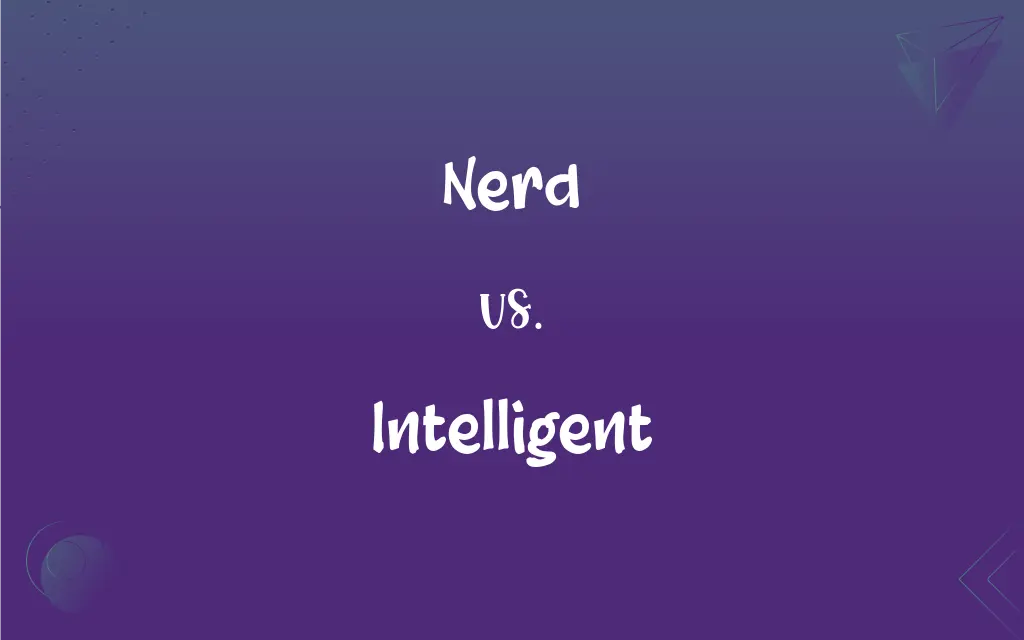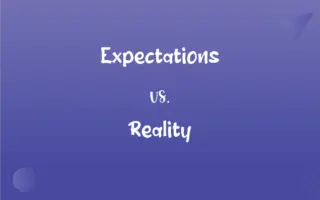Nerd vs. Intelligent: What's the Difference?
Edited by Harlon Moss || By Janet White || Published on December 12, 2023
A nerd is someone deeply interested in specific intellectual or complex subjects, often with a social stereotype, whereas intelligent describes having high mental capabilities or understanding.

Key Differences
A nerd is often perceived as someone extremely interested in academic or technical subjects, sometimes with a lack of social skills. Intelligence, however, refers to the ability to learn, understand, and apply knowledge effectively.
Being a nerd often carries a social stereotype, sometimes seen as overly focused on specific interests like technology, science, or fandoms. Intelligence is a broader term, generally viewed positively, indicating a high level of mental capability and understanding.
Nerds are typically characterized by their intense interest in particular subjects, often leading to deep expertise in those areas. Intelligence manifests in various ways, including problem-solving, creativity, adaptability, and critical thinking.
In popular culture, nerds are often depicted as academically gifted but socially awkward. Intelligence, on the other hand, is depicted in diverse ways, from strategic thinkers to creative geniuses, without specific social implications.
The term nerd is more niche, focusing on specific areas of interest or expertise. Intelligence is a general attribute that can be applied across various fields and is not limited to academic or technical areas.
ADVERTISEMENT
Comparison Chart
Definition
Someone deeply interested in specific subjects
Having high mental capabilities or understanding
Social Connotation
Often stereotyped, sometimes negatively
Generally viewed as a positive attribute
Behavioral Traits
Intense interest, often in technical areas
Broad capabilities, including problem-solving
Cultural Representation
Depicted as academically focused, socially awkward
Diverse representations, no fixed stereotype
Scope
Specific interests or expertise
Broad mental capability across various fields
ADVERTISEMENT
Nerd and Intelligent Definitions
Nerd
Someone deeply interested in technology.
As a computer nerd, she's always up-to-date on the latest gadgets.
Intelligent
Skilled at solving complex problems.
He's intelligent, often finding innovative solutions.
Nerd
A person passionate about academic subjects.
He's a nerd who loves physics and math.
Intelligent
Possessing extensive knowledge or understanding.
She's intelligent and well-versed in world history.
Nerd
An avid follower of specific fandoms.
He's a real comic book nerd and knows every character's backstory.
Intelligent
Having a strong ability to analyze and reason.
An intelligent analysis of the data revealed the trend.
Nerd
Known for expertise in a specialized area.
As a language nerd, he speaks six languages fluently.
Intelligent
Able to grasp concepts quickly.
His intelligent mind picks up new skills easily.
Nerd
A person with intense curiosity about learning.
She's a nerd who spends her weekends at the library.
Intelligent
Exhibiting creativity and originality in thinking.
Her intelligent approach to design is remarkable.
Nerd
A foolish, inept, or unattractive person.
Intelligent
Having intelligence
Is there intelligent life elsewhere in the galaxy?.
Nerd
A person who is single-minded or accomplished in scientific or technical pursuits but is felt to be socially inept.
Intelligent
Having a high degree of intelligence; mentally acute
An intelligent student.
Nerd
A person who is intellectual but generally introverted.
Nerd
One who has an intense, obsessive interest in something.
A computer nerd
A comic-book nerd
Nerd
A member of a subculture revolving around intellectualism, video games, fantasy and science fiction, comic books and assorted media. from 1980s
Nerd
An insignificant student who is ridiculed as being affected or studying excessively
FAQs
Is being a nerd negative?
Not necessarily; it's often a badge of pride about one's interests.
Does intelligence equate to academic success?
Often, but intelligence also manifests in various non-academic ways.
Is intelligence innate or developed?
It's a combination of both innate ability and developed skills.
Can intelligence be measured accurately?
It's challenging, as intelligence is multi-dimensional.
Are nerds always introverted?
Not necessarily; personality varies among individuals.
Can nerds be socially skilled?
Yes, the stereotype of social awkwardness isn't always true.
Can someone be intelligent but not a nerd?
Yes, intelligence is broader and not limited to nerd-like interests.
Are all nerds highly intelligent?
Not always, but they often have deep knowledge in specific areas.
Is intelligence genetic?
Genetics play a role, but environment and learning are also crucial.
Can intelligence be improved?
Yes, through learning, experiences, and mental exercises.
Is emotional intelligence part of being intelligent?
Yes, it's an important aspect of overall intelligence.
Do nerds only like science and technology?
No, they can be passionate about a range of subjects.
How is intelligence perceived in different cultures?
It's generally valued, but cultural perceptions can vary.
Can intelligence decline with age?
Certain cognitive aspects might, but knowledge and experience can grow.
What defines a nerd culture?
A shared enthusiasm for specific, often intellectual, hobbies or topics.
Is intelligence the same as wisdom?
No, wisdom involves experience and insight beyond just intelligence.
Do nerds prefer solitary activities?
Some might, but many enjoy community and shared interests.
Do nerds lack creativity?
No, many are highly creative in their areas of interest.
Can one become a nerd later in life?
Yes, if they develop a deep interest in specific subjects.
Why are nerds stereotyped in media?
It's a cultural trope, often exaggerated for entertainment.
About Author
Written by
Janet WhiteJanet White has been an esteemed writer and blogger for Difference Wiki. Holding a Master's degree in Science and Medical Journalism from the prestigious Boston University, she has consistently demonstrated her expertise and passion for her field. When she's not immersed in her work, Janet relishes her time exercising, delving into a good book, and cherishing moments with friends and family.
Edited by
Harlon MossHarlon is a seasoned quality moderator and accomplished content writer for Difference Wiki. An alumnus of the prestigious University of California, he earned his degree in Computer Science. Leveraging his academic background, Harlon brings a meticulous and informed perspective to his work, ensuring content accuracy and excellence.


































































